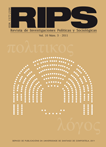Populismo: estrategias conceptuales y debates
Contenido principal del artículo
Resumen
Este artículo constituye una revisión del concepto de populismo más allá de tratar de buscar la precisión y la definición única. Pues a lo largo del manuscrito se sostiene que la mejor manera de abordarlo será centrarse en lo que hacen los populistas. Así, se presenta al populismo como una lógica que divide en partes antagónicas a la sociedad y se desgranan los elementos que existen bajo aquellas lógicas populistas como la creación de enemigos, la importancia del liderazgo o la propia estrategia organizativa
Palabras clave:
Detalles del artículo
Referencias
ARATO, Andrew (2015) “Political Theology and Populism, en DE LA TORRE, Carlos (ed.), The Promise and Perils of Populism. Lexington: Kentucky University Press, 31-59.
ARATO, Andrew y COHEN, Jean (2022) Populism and Civil Society. The Challenge to Constitutional Democracy. Oxford: Oxford University Press. https://doi.org/10.1093/oso/9780197526583.001.0001
BURBANO, Felipe y DE LA TORRE, Carlos (Eds.). El Populismo en el Ecuador. Antología de Textos, (pp. 199-261). ILDIS.
CHERESKY, Isidoro (2015) El nuevo rostro de la democracia. Buenos Aires: Fondo de Cultura Económica.
FINCHELSTEIN, Federico (2014) The Ideological Origins of the Dirty War. Oxford: Oxford University Press. https://doi.org/10.1093/acprof:oso/9780199930241.001.0001
GERMANI, Gino (1978) Authoritarianism, Fascism, and National Populism. New Brunswick: Transaction Books.
GRATTAN, Laura (2016) Populism’s Power. Oxford: Oxford University Press.
GREEN, Joshua (2017) Devil’s Bargain. Steve Bannon, Donald Trump, and the Storming of the Presidency. New York: Penguin Press.
HAWKINS, Kirk (2010) Venezuela’s Chavism and Populism in Comparative Perspective. Cambridge: Cambridge University Press.
HOFSTADTER, Richard (1955) The Age of Reform. New York: Alfred A. Knopf
KRUGMAN, Paul (2018) “Stop Calling Trump a Populist” https://www.nytimes.com/2018/08/02/opinion/stop-calling-trump-a-populist.html
LACLAU, Ernesto (2005) On Populist Reason. London: Verso.
LEFORT, Claude (1986) The Political Forms of Modern Society. Bureaucracy, Democracy, Totalitarianism. Cambridge: MIT Press.
LEVITSKY, Steven y LOXTON, James (2019) “Populism and competitive authoritarianism in Latin America- En: DE LA TORRE, C. (Ed.) The Routledge International Handbook of Global Populism, (pp. 334-351) New York: Routledge. https://doi.org/10.4324/9781315226446-27
MANIN, Bernard (1997) The Principles of Representative Government. Cambridge: Cambridge University Press. https://doi.org/10.1017/CBO9780511659935
MENÉNDEZ CARRIÓN, Amparo (1989) Hacia una interpretación de la naturaleza del comportamiento electoral urbano en contextos de precariedad estructural: propuesta para el caso de Guayaquil. En BURBANO, Felipe y DE LA TORRE, Carlos (Eds.) El Populismo en el Ecuador. Antología de Textos. ILDIS.
MUDDE, Cas (2004) “The Populist Zeitgeist”. Government and Opposition. 39(4), 541–563. https://doi.org/10.1111/j.1477-7053.2004.00135.x
MUDDE, Cas y ROVIRA KALTWASSER, Cristóbal (2012). Populism in Europe and the Americas. Cambridge: Cambridge University Press. https://doi.org/10.1017/CBO9781139152365
OSTIGUY Pierre y ROBERTS, Kenneth. (2016) “Putting Trump in Comparative Perspective: Populism and the Politicization of the Sociocultural Low”. The Brown Journal of World Affairs XXIII (1).
PERUZZOTTI, Enrique. (2013) “Populism in Democratic Times: Populism, Representative Democracy, and the Debate on Democratic Deepening”. En Carlos de la Torre and Cynthia J. Arnson, eds. Latin American Populism in the Twenty-First Century. Baltimore: The John Hopkins University Press, 61 – 85.
QUINTERO, Rafael. (1989) El mito del "populismo velasquista" y la consumación del pacto oligárquico. En Antología del pensamiento crítico ecuatoriano contemporáneo. Quito: CLACSO, 181-212. https://doi.org/10.2307/j.ctvnp0jp6.9
TRAVERSO, Enzo (2019) The New Faces of Fascism. Populism and the Far Right. London: Verso.
URBINATI, Nadia (2019) Me the People. How Populism Transforms Democracy. Cambridge: Harvard University Press. https://doi.org/10.4159/9780674243576
WEYLAND, Kurt (2001) “Clarifying a Contested Concept”. Comparative Politics, 34 (1): 1–22. https://doi.org/10.2307/422412






